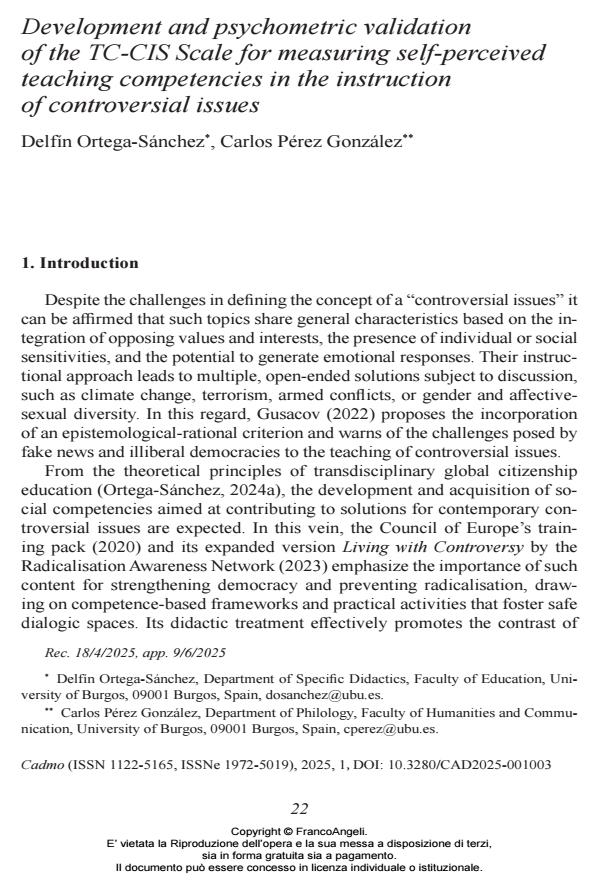Development and psychometric validation of the TC-CIS Scale for measuring self-perceived teaching competencies in the instruction of controversial issues
Titolo Rivista CADMO
Autori/Curatori Delfín Ortega-Sánchez, Carlos Pérez González
Anno di pubblicazione 2025 Fascicolo 2025/1
Lingua Inglese Numero pagine 18 P. 22-39 Dimensione file 229 KB
DOI 10.3280/CAD2025-001003
Il DOI è il codice a barre della proprietà intellettuale: per saperne di più
clicca qui
Qui sotto puoi vedere in anteprima la prima pagina di questo articolo.
Se questo articolo ti interessa, lo puoi acquistare (e scaricare in formato pdf) seguendo le facili indicazioni per acquistare il download credit. Acquista Download Credits per scaricare questo Articolo in formato PDF

FrancoAngeli è membro della Publishers International Linking Association, Inc (PILA)associazione indipendente e non profit per facilitare (attraverso i servizi tecnologici implementati da CrossRef.org) l’accesso degli studiosi ai contenuti digitali nelle pubblicazioni professionali e scientifiche
This study presents the development and psychometric validation of the Teaching Competencies in Controversial Issues Instruction Scale (TC-CIS), designed to measure perceived selfefficacy and institutional support in the didactic treatment of controversial issues. A cross-sectional instrumental design was applied to a sample of 684 Spanish social and experimental sciences teachers. Following an item development process based on a literature review and expert judgment (BW = 0.95; AC2 = 0.95), the 10item scale underwent Confirmatory Factor Analysis. The resulting bifactorial model demonstrated an excellent fit (?²/df = 1.15; CFI = 0.998; TLI = 0.997; RMSEA = 0.015; SRMR = 0.018), with factor loadings ranging from 0.79 to 0.87 and a low correlation between factors (r = 0.02). Internal reliability was high (a_total = .86; ? = .86; FC = .96), and convergent validity was satisfactory (AVE = .67). Moreover, configural, metric, scalar, and strict invariance were confirmed across gender, age, origin, educational stage, and prior training (?CFI = 0.01). However, predictive validity analysis indicated a limited discriminatory capacity regarding teachers’ formative intention (AUC = 0.572). It can be concluded that the Teaching Competencies in Controversial Issues Instruction Scale (TCCIS) provides a brief, robust, and culturally stable measure of teaching competencies for addressing sensitive or controversial issues in Social and Experimental Sciences classrooms, although its predictive power needs further specification and its applicability in international contexts should be explored.�
Parole chiave:teaching competencies, controversial issues, psychometric validation, pedagogical selfefficacy, Social and Experimental Sciences education.
Delfín Ortega-Sánchez, Carlos Pérez González, Development and psychometric validation of the TC-CIS Scale for measuring self-perceived teaching competencies in the instruction of controversial issues in "CADMO" 1/2025, pp 22-39, DOI: 10.3280/CAD2025-001003